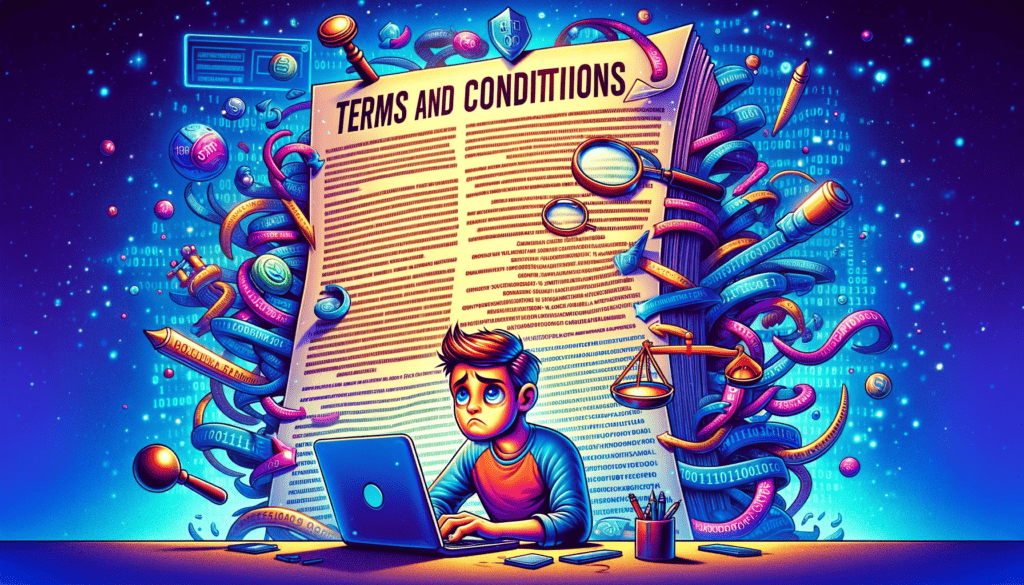
Understanding the Importance of Terms and Conditions
In the digital world, almost every interaction, purchase, or subscription starts with a familiar prompt: “I have read and agree to the Terms and Conditions.” These documents, packed with legal jargon and intricate details, often seem daunting and time-consuming. As a result, many of us click ‘agree’ without a second thought. But what are we really signing up for? This article delves into the hidden dangers of ignoring terms and conditions and why it’s crucial to understand what you’re agreeing to.
The Hidden World of Terms and Conditions
Terms and conditions, often seen as lengthy and tedious, are in fact legally binding contracts. They outline the rules, requirements, and limitations of using a service or product. When you don’t read these terms, you risk agreeing to conditions that may not align with your interests or rights.
Why Terms and Conditions Matter
These documents play a pivotal role in defining your relationship with the service provider. They detail your rights, the provider’s obligations, and the scope of your privacy and data usage. In a world where data is as valuable as currency, understanding these aspects is crucial.
The Consequences of Ignorance
By skipping the terms and conditions, you may inadvertently agree to unwanted subscriptions, give up privacy rights, or even consent to sharing personal data in ways you wouldn’t normally approve of. This lack of knowledge can lead to various problems, ranging from minor inconveniences to significant legal issues.
The Risks of Skipping Terms and Conditions
Neglecting to read terms and conditions can lead to several risks, some of which might significantly impact your life and finances.
Privacy Concerns
One of the primary risks involves your personal data. Many companies collect and use customer data, and the terms often include clauses about how your information is handled. Without reading these terms, you could be unknowingly consenting to the sale or misuse of your personal information.
Unintended Agreements
Automatic renewals, hidden fees, or clauses that limit your ability to take legal action are common in many agreements. By not reading the fine print, you could be binding yourself to terms that are not only financially burdensome but also legally restrictive.
Legal Implications
In certain cases, agreeing to terms and conditions without reading can lead to severe legal consequences. For instance, you might waive your right to a trial or agree to settle disputes in arbitration, which can be less favorable to consumers.
The Illusion of Control
Many users believe that they have little influence over terms and conditions, leading to a sense of resignation and passive acceptance. However, understanding and engaging with these documents can empower you to make more informed decisions.
The Myth of No Choice
The notion that users must accept terms as presented is a misconception. In reality, you always have a choice – to agree, disagree, or negotiate terms in some cases. Knowing your rights can give you a sense of control and empowerment.
The Power of Knowledge
Being informed about the content of terms and conditions can change the way you interact with digital services. It can lead to more conscious decision-making and a better understanding of your digital footprint.
Changing the Narrative
As consumers become more informed and vocal about unfair terms, companies may feel the pressure to offer clearer and more equitable agreements. Your attention and understanding of these terms can contribute to this change.
Real-Life Consequences of Ignoring Terms and Conditions
The implications of not reading terms and conditions are not just theoretical. Real-life examples abound where individuals or companies have faced significant consequences due to this oversight.
Case Studies
From unexpected charges to privacy breaches, numerous case studies illustrate the pitfalls of ignoring the fine print. For instance, a well-known social media platform faced backlash and legal issues due to unclear terms regarding data usage.
Learning from Others’ Mistakes
Examining these cases provides valuable lessons in the importance of being diligent about terms and conditions. They serve as reminders that a few minutes of reading can prevent a lot of trouble down the line.
Avoiding Similar Pitfalls
These stories offer practical insights into the risks associated with digital agreements and how to avoid them. They highlight the need for vigilance and informed decision-making in our online interactions.
The Complexity of Legal Jargon in Terms and Conditions
One significant barrier to understanding terms and conditions is the complex legal language often used in these documents. This section addresses why this complexity is problematic and what users can do to navigate it.
Deciphering Legal Speak
Legal jargon can be intimidating and impenetrable for the average user. However, breaking down common legal terms and phrases can make these documents more accessible and understandable.
The Need for Simplification
There’s a growing call for the simplification of legal documents, including terms and conditions. Clearer language not only benefits users but can also enhance the company’s reputation for transparency and fairness.
Tools and Resources
Various tools and resources are available to help users understand complex legal documents. From online glossaries to services that translate legal terms into plain language, these resources can be invaluable.
The Role of Consumer Rights in Terms and Conditions
Being aware of your rights as a consumer is crucial when navigating terms and conditions. This knowledge can help you make informed decisions and protect your interests.
Knowing Your Rights
Understanding your basic consumer rights, such as the right to privacy, the right to be informed, and the right to opt-out, is essential. These rights are often protected under law and can give you leverage in dealing with unfair terms.
How to Exercise Your Rights
If you disagree with certain terms or find them unfair, there are ways to assert your rights. This might involve negotiating with the service provider, seeking legal advice, or using consumer protection services.
Advocacy and Change
Consumer advocacy plays a vital role in shaping fairer terms and conditions. By being informed and vocal about your rights, you can contribute to the push for more equitable digital agreements.
The Psychological Aspect of Agreeing Without Reading
There are several psychological factors that contribute to the common practice of agreeing to terms and conditions without reading them. Understanding these factors can help in developing strategies to overcome this habit.
The Trust Factor
Many people trust well-known companies and assume that these entities will act in their best interest. However, this trust can sometimes be misplaced, especially when it comes to protecting personal data.
Convenience Over Caution
The desire for quick access often overrides the caution required to review terms thoroughly. Recognizing this tendency is the first step towards changing this behavior.
Overcoming the Hurdles
Developing strategies to overcome these psychological barriers is key. Setting aside time to read terms, using tools to decipher legal language, and reminding oneself of the potential risks are effective ways to ensure you’re fully informed.
The Impact of Not Reading Terms and Conditions on Businesses
Businesses, just like individuals, can face significant consequences from not reading terms and conditions, especially when using other companies’ services or software.
Business Liabilities
Failing to understand the terms can lead to legal and financial liabilities for businesses. This is particularly true for small businesses that may not have the resources to recover from such setbacks.
Reputation and Trust
A company’s reputation can suffer if it’s found to be non-compliant with terms it agreed to, resulting in a loss of customer trust and potential legal repercussions.
Best Practices for Businesses
It’s crucial for businesses to thoroughly review and understand the terms of any service or product they use. Establishing best practices for contract review and compliance can safeguard against unforeseen liabilities.
The Evolution of Terms and Conditions in the Digital Age
The digital age has transformed how terms and conditions are created, presented, and enforced. This evolution reflects the changing nature of technology and its impact on consumer interactions.
The Digital Transformation
The rise of digital platforms has led to more complex terms and conditions, addressing issues like data usage, privacy, and digital rights. This evolution is ongoing, with new challenges emerging as technology advances.
Future Trends
Predictions for the future of terms and conditions include increased use of AI for personalization, greater transparency driven by consumer demand, and more user-friendly formats.
The Role of Regulation
Regulations like the GDPR in the EU have already had a significant impact on how companies draft and enforce their terms. These regulations are likely to continue shaping the landscape of digital agreements.
Navigating the Maze of Terms and Conditions
Navigating terms and conditions doesn’t have to be an overwhelming task. With the right approach and tools, you can effectively understand and manage these agreements.
Tips and Tricks
Key tips include focusing on sections related to data privacy, fees, and user rights. Look for summaries or plain-language versions of the terms, and don’t hesitate to reach out to the company for clarifications.
Prioritizing What Matters
Identifying the most impactful clauses is crucial. Focus on what directly affects your use of the service, such as data handling, cancellation policies, and liability clauses.
Time Management
Balancing thoroughness with practicality is key. You don’t need to read every word, but paying attention to the critical parts can save you from future headaches.
Things Worth Considering
In conclusion, while reading terms and conditions may seem tedious, it’s a crucial step in protecting your rights and interests in the digital world. It’s about being an informed consumer and making conscious choices about the services you use and the agreements you enter into. By taking the time to read and understand these documents, you’re not only safeguarding your personal information and financial well-being but also contributing to a broader movement towards transparency and fairness in the digital age.
Remember, knowledge is power. The more informed you are about the terms and conditions of the services you use, the better equipped you’ll be to make decisions that align with your values and protect your interests.






Leave a Reply